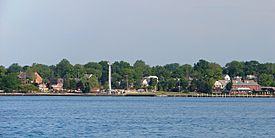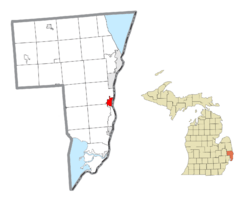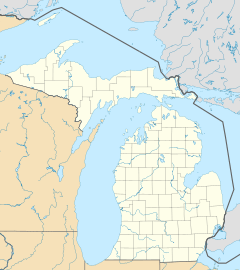St. Clair, Michigan facts for kids
Quick facts for kids
St. Clair
|
|
|---|---|

View from across the St. Clair River
|
|
| Nickname(s):
Saint Clair
|
|

Location within St. Clair County
|
|
| Country | United States |
| State | Michigan |
| County | St. Clair |
| Government | |
| • Type | Council–manager |
| Area | |
| • Total | 3.62 sq mi (9.37 km2) |
| • Land | 2.94 sq mi (7.61 km2) |
| • Water | 0.68 sq mi (1.75 km2) |
| Elevation | 584 ft (178 m) |
| Population
(2020)
|
|
| • Total | 5,464 |
| • Density | 1,858.50/sq mi (717.64/km2) |
| Time zone | UTC-5 (Eastern (EST)) |
| • Summer (DST) | UTC-4 (EDT) |
| ZIP code(s) |
48079
|
| Area code(s) | 810 |
| FIPS code | 26-70680 |
| GNIS feature ID | 1624881 |
St. Clair is a friendly city located in St. Clair County, in the eastern part of Michigan. It's often called the "Thumb" area of the state because of its shape on a map.
The city sits right on the beautiful St. Clair River. In 2010, about 5,485 people lived here. St. Clair is a great place to visit, especially for its river views and parks!
Contents
About St. Clair's Location
St. Clair is located in the eastern part of Michigan, right on the St. Clair River. This river is an important waterway.
- The city covers about 3.61 square miles (9.35 square kilometers).
- Most of this area is land, but about 0.68 square miles (1.76 square kilometers) is water.
- St. Clair is part of a region known as "the Thumb" of Michigan.
- It's also considered part of the "Blue Water area," which is a smaller part of the Thumb.
- Many nice homes are built along the St. Clair River.
- The area attracts lots of visitors from nearby Metro Detroit.
How St. Clair Got Its Name
The city of St. Clair gets its name from the St. Clair River, which flows right by it. The river, in turn, was named after Lake Saint Clair.
- French explorers named the lake in the 1600s.
- On August 12, 1679, an expedition led by René Robert Cavelier, Sieur de La Salle entered the lake.
- August 12 is the feast day of Saint Clare of Assisi, a famous saint.
- So, they named the lake Lac Sainte-Claire in her honor.
- Over time, the French spelling "Sainte-Claire" changed to the English "St. Clair."
- This change happened on maps as early as 1755.
Some people mistakenly think the city was named after American Revolutionary War General Arthur St. Clair. However, the name "St. Clair" was used for the lake and river long before he became famous. Others thought it might be named after Patrick Sinclair, a British officer who built a fort nearby. But the name's true origin is from Saint Clare of Assisi.
A Look Back at St. Clair's History
The history of St. Clair goes back a long way, even before it became a city.
Early Beginnings
- In 1764, the British built a fort called Fort Sinclair near where the Pine River meets the St. Clair River.
- This fort was important for protecting shipping routes between Detroit and Fort Michilimackinac.
- Colonel Patrick Sinclair was in charge of building it.
- The fort also became a trading post and a place where wood was cut at a sawmill.
- It operated for about 20 years.
Becoming a Town
- In 1817, a man named Robert Fulton planned out a town on the north side of the Pine River.
- He worked to create St. Clair County and made his settlement the county seat.
- St. Clair was the county seat until 1871, when the county government moved to Port Huron.
- In 1826, Thomas Palmer bought Fulton's undeveloped town. For a while, the village was even called Palmer.
Growing Industries
- The sawmill business grew quickly because there were many pine and oak trees nearby.
- Clay from the Pine River banks was used to make bricks, and several brickyards operated for many years.
- Shipbuilding also started in the 1820s and continued for a century.
- Many men from St. Clair became sailors on the Great Lakes.
- In 1887, the Diamond Crystal Salt Company began mining the huge underground salt deposits in the area.
A Popular Resort Town
- In the late 1800s, St. Clair became a well-known vacation spot.
- Fancy hotels like the Oakland Hotel (built in 1881) and the Somerville Hotel (built in 1888) opened.
- These hotels offered mineral baths, which were popular for health and relaxation.
- Passenger steamboats would stop daily at the hotel docks, bringing tourists.
Modern Improvements
- In the 1960s, the downtown area was updated.
- A big part of this project was making Palmer Park larger.
- The park now has a lovely boardwalk along the St. Clair River, which is a favorite spot for locals and visitors.
Population and People
St. Clair has seen its population grow over the years.
| Historical population | |||
|---|---|---|---|
| Census | Pop. | %± | |
| 1860 | 1,530 | — | |
| 1870 | 1,790 | 17.0% | |
| 1880 | 1,923 | 7.4% | |
| 1890 | 2,353 | 22.4% | |
| 1900 | 2,543 | 8.1% | |
| 1910 | 2,633 | 3.5% | |
| 1920 | 3,204 | 21.7% | |
| 1930 | 3,389 | 5.8% | |
| 1940 | 3,471 | 2.4% | |
| 1950 | 4,098 | 18.1% | |
| 1960 | 4,538 | 10.7% | |
| 1970 | 4,770 | 5.1% | |
| 1980 | 4,780 | 0.2% | |
| 1990 | 5,116 | 7.0% | |
| 2000 | 5,802 | 13.4% | |
| 2010 | 5,485 | −5.5% | |
| 2020 | 5,464 | −0.4% | |
| U.S. Decennial Census | |||
What the 2010 Census Showed
- In 2010, there were 5,485 people living in St. Clair.
- There were 2,306 households, which are groups of people living together.
- About 30.3% of households had children under 18.
- The average age of people in the city was about 42.5 years old.
- About 23.9% of residents were under 18 years old.
- About 15.2% of residents were 65 years or older.
- The population was made up of slightly more females (51.7%) than males (48.3%).
Fun Events in St. Clair
St. Clair hosts several exciting events throughout the year that bring the community together.
- Blue Water Ramble: This is an annual international bicycling event. It takes place on the first weekend of October.
- St. Clair Art Fair: Artists show their work at this two-day event. It happens on the last weekend in June.
- St. Clair Boat Races and River Fest: These thrilling boat races and a festival are held downtown. You can catch them on the last weekend of July.
- Will on the Water Shakespeare Festival: Enjoy plays by William Shakespeare outdoors. This festival is held on the second weekend in August.
Local Industries
St. Clair is home to some important industries that provide jobs and products.
- Cargill Salt: This company operates a very large salt mine and processing plant in St. Clair. It's the only place in the U.S. that makes a special type of salt called Alberger salt. This salt is popular in the fast food industry because of its unique shape and lower sodium content.
- Power Plants: The St. Clair Power Plant and Belle River Power Plant are also important to the area. While they are not inside the city limits, they are just a few miles south along the St. Clair River. They help provide electricity.
See also
 In Spanish: St. Clair (Míchigan) para niños
In Spanish: St. Clair (Míchigan) para niños
 | Kyle Baker |
 | Joseph Yoakum |
 | Laura Wheeler Waring |
 | Henry Ossawa Tanner |


